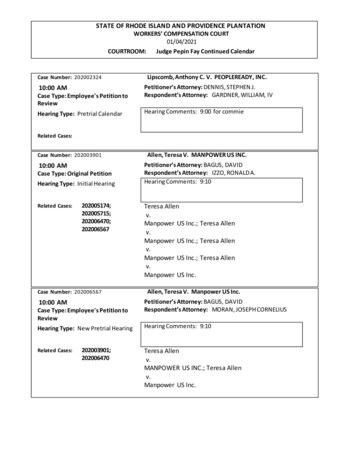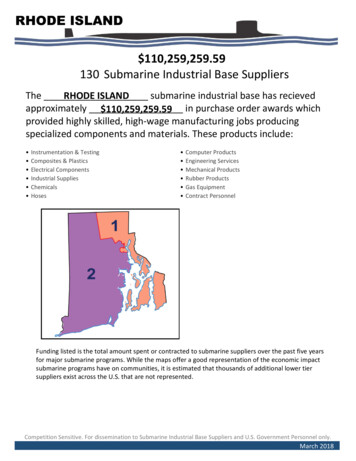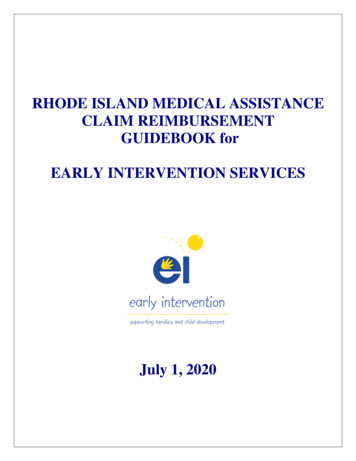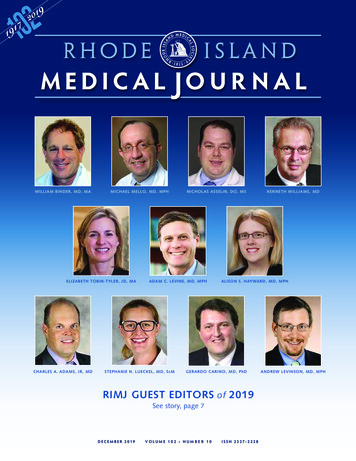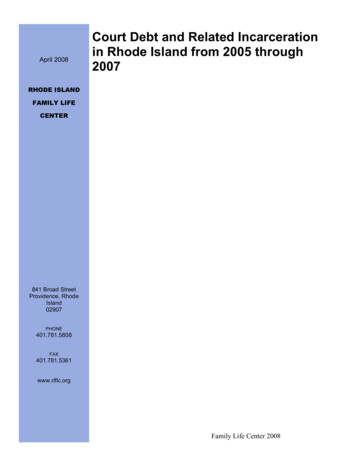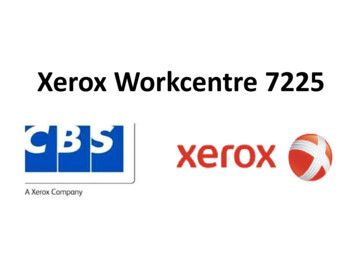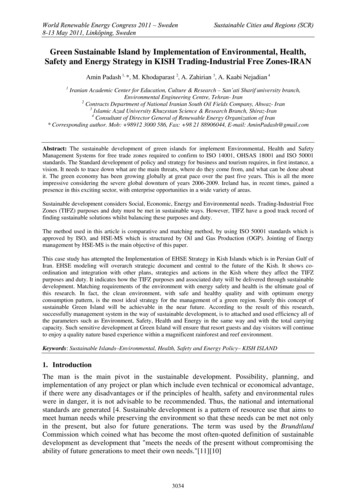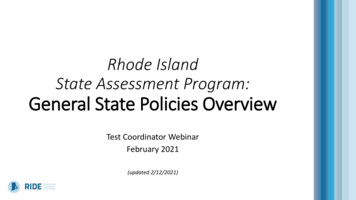
Transcription
Rhode IslandState Assessment Program:General State Policies OverviewTest Coordinator WebinarFebruary 2021(updated 2/12/2021)
Agenda Overview of the RI State Assessment Program RISAP Assessments by Grade and Content Area Coronavirus and the RI State Assessment Program Roles and Responsibilities District and School Test Coordinators Technology Coordinator Test Administrators and Proctors Test Security Student Participation in RI State Assessments Accommodations and Accessibility Features Assessment Scheduling Closing2
Overview of the RI State Assessment ProgramThis table shows the test, the content area(s), and grade levels tested of all state assessments.Alternate AssessmentsKindergarten123456789101112ACCESS 2.0 forElsAlternateACCESS for ElsEnglish languageproficiencyEnglish DLMELA LA andmathPSATTM10reading and mathSAT School Day withEssayReading, writing, and math3456781011111111123
Coronavirus and the RI State Assessment Program Assessment dates and policies may shift to accommodate changes in response toCOVID-19. RIDE will notify test coordinators of any changes or updates that impact any partof the state assessment system and post those changes at www.ride.ri.gov/TC. Test Coordinators may need to adjust some test administration protocols inaccordance with health and safety protocols released by RIDE. Please consult RIDE’s COVID-19 page for guidance (www.ride.ri.gov/COVID-19). Please contact the Assessment Team with any questions. Please plan to administer all state assessments in-person in the school building.There are no remote options for these assessments. Currently, the U.S. Department of Education has not indicated or announced any changes tothe current regulations, requirements, or calculations to accountability or state assessments,so we are operating under our current system. For accountability purposes, students who do not take the state assessments expected fortheir grade level will be considered non-participants unless they either have a RIDE-approvedmedical exemption or are first-year EL students not taking the ELA portion of a particularassessment (see the RISAP TC Handbook posted at www.ride.ri.gov/TC).4
Roles and Responsibilities5
District Test Coordinator: Role and ResponsibilitiesRISAP Test Coordinator Handbook (page 10) Qualifications: Superintendent, assistant superintendent, curriculum director, director ofteaching and learning, or designee employed by the LEA Responsible for coordination of test administration across the LEA: Develop local policies and procedures to maintain test security.Disseminate and communicate policies and procedures to all involved in testing.Investigate test security breaches and report them to RIDE as necessary.Ensure that student data delivered to RIDE is accurate and up-to-date.Ensure all staff involved with test administration participate in training andreceive their certification Ensure all students are tested.6
School Test Coordinator: Role and ResponsibilitiesRISAP Test Coordinator Handbook (page 10) Qualifications: Principal or designee (assistant principal, department chair, etc.) employed by the LEA Responsibilities: Proper preparation, administration, and follow-up for all state assessments School-level testing schedule development and communication Ensure that all staff involved with test administration: Participate in scheduled training for test administration and test security As appropriate, receive training in accommodations and administer them properly during test administration Receive the test administration manuals for tests they will administer Receive the Test Security Requirements for that assessment Communicate security protocols (including cell phone policies), and report security breaches and/orirregularities to district test coordinator Order, receive, inventory, distribute, and return test materials Communicate information to parents and students about testing and provide students with opportunitiesto practice on the testing platforms Ensure accurate and up-to-date student data in the district SIS7
Technology Coordinator: Role and Responsibilitiessee test coordinator manual for the particular assessment for detailed responsibilities Qualifications: District and/or school technology director, IT director, or designee with technical expertiseemployed by the school or LEA Responsibilities: Ensures all devices used for testing are prepared and functionproperly according to each assessment’s technical guidelines Ensuring testing devices meet technical requirements Installing the secure browser or testing application Removing (or disabling) any software that would allow secure test material on testingdevices to be viewed on another device during testing Providing technical support during testing Designating someone at each testing location (school) to serve as site-based technologycoordinator during testing8
Test Administrator QualificationsRISAP Test Coordinator Handbook (page 11) Individuals employed by the LEA as teachers LEA and school administrators Long-term substitutes School psychologists, school social workers, librarians, school guidancecounselors, and speech pathologists Teachers employed by the district who hold provisional certificatesNOTE: Student teachers may not administer state assessments, but can serve as hall monitors and assistthe test administrator with materials.9
Test Administrator ResponsibilitiesRISAP Test Coordinator Handbook (page 11) Attend all training sessions for the tests you will be administering. Read all test administration manuals and accommodations manuals prior to testing. Follow all test security procedures. Make sure you understand and sign the Test Security Agreements. Actively supervise the test at all times. Ensure that any accommodations decisions are made well before testing begins. Know how to administer any accommodations students will be using. Practice with students receiving accommodations, especially if using any assistivetechnology or other accommodation delivered online.10
Proctor Qualifications and ResponsibilitiesRISAP Test Coordinator Handbook (pages 11-12) Who can be a proctor? Individuals employed by the school or LEA. Student teachers may serve as proctors but they cannot administer the test or be alone with thestudents; the test administrator must be present at all times. Classes larger than 25 students may benefit from having a proctor in addition to the Test Administrator. Proctor responsibilities: ensuring test security protocols are followed answering basic test questions helping the test administrator monitor the studentsNOTE: College Board calls proctors “monitors”.11
Test Administrator Training RequirementsRISAP Test Coordinator Handbook (pages 12-13)For all state assessments, any school personnel who will have access to secure test content must: Be trained in: Test security policies and procedures; including security procedures implemented by your school. Test administration policies and procedures Accommodations administration. Receive: test administrator manuals test security requirements documents Any other manuals or information necessary for the tests being given. Document: Training: Sign-in for all training and submit any copies of your certificates of completion to your school testcoordinator. Keep a copy of online training module completion certificates for your records. Test Security Agreements: Sign and submit any test security agreement(s) to your school test coordinator and keep acopy of the test security agreement for your records. Test Materials: Sign all tracking sheets for any test materials you receive.12
Test SecurityRISAP Test Coordinator Handbook (pages 13-15)13
General Security Requirements All educators involved with preparing for or administering any part of the state assessments must: be trained in test security requirements and document their participation, and sign the required affirmation of test security documents for each assessment. receive and read the Test Administrator Manual(s) for that assessment and follow the security and testadministration protocols therein. ensure all secure materials are tracked and monitored when not stored in the locked storage area designatedby the School Test Coordinator. report all testing irregularities to their School Test Coordinator and follow protocol to ensure test security isnot compromised. Only authorized personnel may enter testing rooms while students are testing. Researchers, parents, reporters, students not scheduled to be testing, and school personnel not assigned tothe room as test administrators or proctors are not allowed to enter the testing rooms. School administrators, district personnel, and RIDE observers may enter testing rooms to monitor and observetesting procedures. Technology staff may enter testing rooms to troubleshoot problems, but like all other personnel, are notpermitted to photograph or otherwise view secure test content.14
“Secure” vs. “Non-Secure” MaterialsSecure Content & MaterialsNon-Secure Content & Materials Test questions, passages, question response options Test Coordinator Manuals Any onscreen test content Test Administrator Manuals and scripts Student test booklets Unused paper (does not have anystudent writing): All student responses to test questions; including thosegenerated by speech-to-text devices, typed on anothercomputer, taken by a scribe, or derived by the student usingmanipulatives. Student (and proctor) testing tickets for computer-based testing. Used scratch paper that contains student writing. scratch paper (any assessment) reference sheets (RICAS Math) graphic organizers (RICAS ELA) Periodic Tables (NGSA) Any other reference sheets or test materials that containstudent writing.All test materials must be returned to theschool test coordinator.15
Keep Test Materials Secure Receipt: Be aware of the schedule for receiving secure test materials for the various assessments sothat the materials are signed for and kept track of once delivered. Storage: Keep test materials in locked central storage when tests are not being administered. Access and Materials Transportation: Restrict access to the locked storage area only to those schoolpersonnel authorized to access secure materials. Tracking Forms: Monitor and account for all secure test materials at all times, particularly before andafter each test session through the use of tracking forms. Student Devices: If a student needs to finish their test in a different room (test completion room, forexample), ensure that no test items are visible on the screen of the device while it’s being moved(e.g., log out or otherwise follow directions in the assessment’s test administrator manual). Post-Testing Actions: Securely destroy (e.g., shred) student testing tickets, proctor testing tickets, andused scratch paper/reference sheets (i.e., written on by students) once all testing has beencompleted. Return Shipment: For secure test materials to be returned to the vendor (e.g., paper test booklets),pack and ship the materials as directed in the assessment’s test coordinator manual.16
Materials Prohibited for Student Use during TestingEach assessment’s TAM lists and defines the materialsrequired, permitted, or prohibited during testing. Before and during testing, all materials relating to the subject area being tested must be coveredor removed from the testing space. See test-specific TAMs for details. Note that the following materials are always prohibited for use by students during testing: Cell phones Electronic devices (other than the device used for computer-based testing or an accommodation) that accessthe Internet Devices that can take photographs Dictionaries or thesauruses that contain pictures and/or definitions* Any reference sheets or notes, other than the approved printed reference sheets listed in the TAM or otherapproved materials for students with disabilities assigned those accommodations. Use of prohibited materials during testing is considered a testing irregularity, and may result ininvalidation of scores.*Word-to-word dictionaries for Els are allowable as an accommodation except on ACCESS tests.17
Examples of Test IrregularitiesA test irregularity is any action that results in non-standard test administration.Test irregularities may result in invalidating scores.Examples include: Allowing someone to administer the test who has not completed all test administration training; coaching, erasing, altering, or interfering with students’ test responses in any way; giving students access to test questions or prompts prior to testing; questioning students about test content after the test; copying, reproducing, or using any test materials in a way that is inconsistent with test administration or security policies; making notes on any test content that students see; this includes test items, reading passages, and science scenarios; failing to follow security procedures for receiving and returning test materials as directed, or failing to account for all secure testmaterials before, during, and after testing; failing to follow test administration directions or failing to read provided script; failing to provide a documented accommodation or providing an accommodation not documented in the student’s IEP; and failing to prohibit cell phone use during testing.18
What if a student has a cell phone during the test?If the student has a deviceduring testing: Collect the device. Stop testing the student. Remove the student fromthe testing room. Notify the test coordinatorimmediately. The school test coordinatorwill contact the district testcoordinator. The district test coordinatorwill contact RIDE.If the TA suspects, but ha
Post-Testing Actions: Securely destroy (e.g., shred) student testing tickets, proctor testing tickets, and used scratch paper/reference sheets (i.e., written on by students) once all testing has been completed. Return Shipment: For secure test materials to be returned to the vendor (e.g., paper test booklets),

